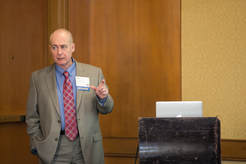
This sort of stuff happened when I was growing up, but it didn't involve guns and mass killings. Pent up frustrations were taken out on property - bricks through windows, slashed tires, and profane graffiti splashed on the outside walls. Troubling, yes. Deadly, never.
So, while politicians twist in the wind debating the "merits" of allowing anyone off of the street to buy semi-automatic weapons and live ammunition, we educators should take the opportunity to figure out why kids sometimes leave school feeling aggrieved and resentful.
Our school is currently taking part in a series of "Instructional Rounds"(IR). Based on a practice originating out of the Harvard Graduate School of Education, IR is a process through which teachers and administrators develop a "problem of practice" which represents a tricky, systemic issue which, if solved, could improve the quality of the learning experience for kids. One issue that has bubbled to the surface for us, and one that is typical of most schools, is how we can more effectively manage "unexpected" behaviours by students that have a negative impact on the learning environment for their peers.
We currently have the following policies and practices in place: clearly articulated Codes of behaviour (including escalating consequences) for elementary and secondary students; three academic blocks each week, in every grade, of Social Emotional Learning led by one of our five counsellors focusing on social thinking, personal problem-solving, anti-bullying, zones of regulation, self-esteem, making friends, risky behaviours...(you get the drill!); and, a Social Development (behaviour intervention) Unit staffed by three excellent full-time, highly trained staff members who handle the vast majority of our exclusions and re-entry plans. We have pro-active administrators and supportive parents.
And yet, it is still a "problem of practice" and our classrooms, hallways, and playgrounds remain characterized by outbursts of the unexpected resulting in the usual range of consequences.
So, when a team of our teachers (along with some outside educators from two other schools) took a look at the problem, their preliminary observations identified five key barriers that seem to be preventing us from reaching our goal:
1. Lack of awareness: To be honest, some staff members were oblivious to what was percolating in their classes until it bubbled over into a problem.
2. Lack of knowledge: In spite of the sharing of comprehensive policies and procedures online and in print form, many of our teachers, parents and even some administrators, simply didn't know the rules or how to manage specific behaviours or how to access available in-house resources.
3. Lack of consistency: Expectations varied widely from class to class; between genders and age groups; and, even among students within a single classroom.
4. Lack of effective communication: Among staff members, with parents, and with supportive outside agencies.
These four barriers led to the fifth and most important one:
5. Lack of Fairness: Kids have a natural sense of justice. They can spot differences in treatment from student to student, teacher to teacher, administrator to administrator, and family to family. They know when we educators act as judge, jury and executioner without due process and consistent approaches.
We have a good school and great kids. As a full spectrum special education school, it is critically important that we support our students in developing socially acceptable solutions to problems, and make sure that every student has a chance to learn. So this is our "problem of practice". At the end of the day, no matter what the final outcome for a student, it is our goal to ensure that they have been treated fairly, and with respect. Hopefully that will mean that when we part company, it will be on relatively good terms.
Or, we could simply implement the alternative approach recommended by the President of the United States:
Teachers should be armed...This would be obviously only for people who were very adept at handling a gun, and it would be, it's called concealed carry, where a teacher would have a concealed gun on them. They'd go for special training and they would be there [in case of trouble].
But that would be just nuts!










 RSS Feed
RSS Feed